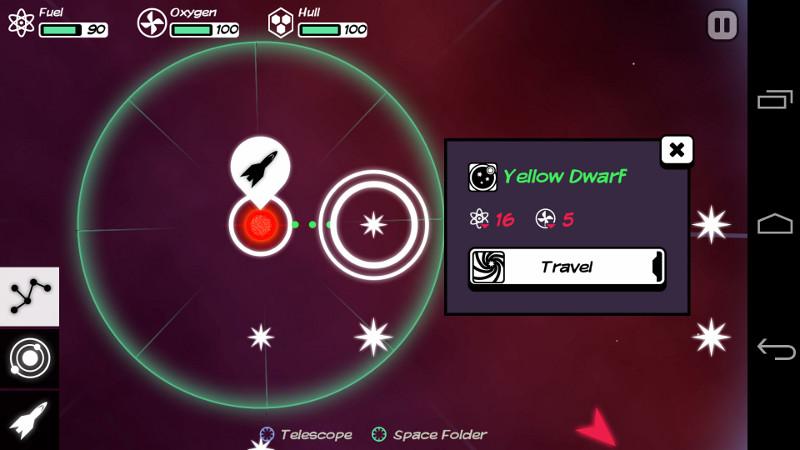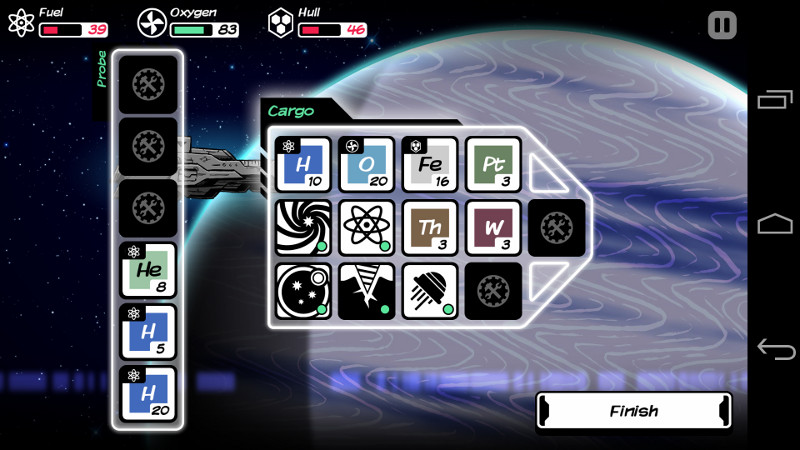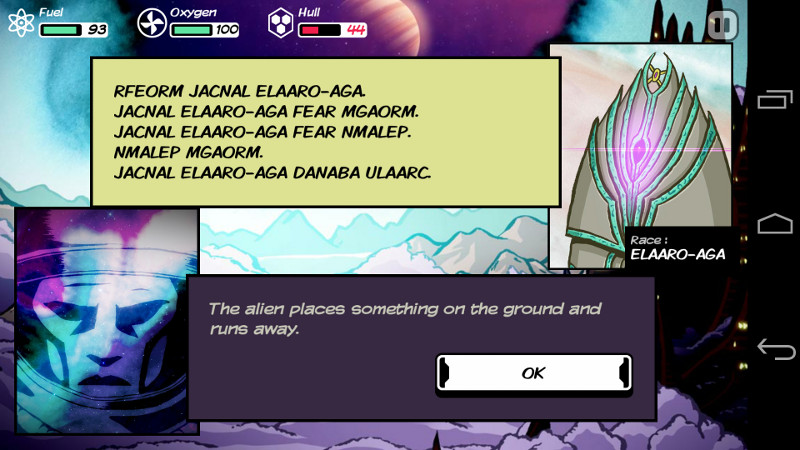Out There | reviews, news & interviews
Out There
Out There
A classy choose-your-own-adventure in deepest space

In the animated cutscene that begins Out There, the game lays out its basic premise. You are an astronaut frozen in cryonic sleep and then sent wildly off course by some mysterious event. You awake in an unfamiliar solar system with limited supplies of fuel and oxygen, a newly-acquired interstellar drive and a vague plan to reach a distant star.
To reach your goal you must hop from one star system to another, gathering resources and discovering alien technologies to help you on your way. At first glance, Out There looks a lot like last year's indie hit, FTL. Unlike the tense, extended chase sequence that made up the bulk of that game however, Out There features no combat and few actual enemies. What you are fighting in this game is asphyxiation, the harsh conditions of interstellar space and crushing loneliness.
 The game takes you through a cycle of related modes. You begin in a zoomed-out map of your current position on a galactic map, with your ship's meagre telemetry able to detect a few stars within hyperdrive range. Once you have leaped to a star system the view changes to a local solar system map showing the star and any planets in its orbit, all of which can be visited to harvest resources if you have the necessary equipment.
The game takes you through a cycle of related modes. You begin in a zoomed-out map of your current position on a galactic map, with your ship's meagre telemetry able to detect a few stars within hyperdrive range. Once you have leaped to a star system the view changes to a local solar system map showing the star and any planets in its orbit, all of which can be visited to harvest resources if you have the necessary equipment.
The third mode takes you into the orbit of a gas giant, the surface of a rocky (mineral rich) or verdant (home to contactable life and a source of oxygen and organic compounds) world. You can drill for resources, probe for gases or contact any life forms you encounter, uncovering fragments of their alien language as you go.
Resources come in the form of chemicals that you store in your ship's hold and can combine to make new equipment like scanners, fuel scoops and shields or spend on repairs or fuel. You only have a certain number of slots on your ship, each of which can hold up to 20 units of a single chemical or one piece of equipment. Almost everything you do in Out There has a cost in terms of fuel, damage or oxygen usage so managing these resources is crucial to your survival and success.
Your explorations are interrupted by random events like asteroid strikes, strange objects to investigate and sudden crises that can earn you resource or equipment boons or send you wildly off course. You will discover abandoned alien craft that you can take over, offering new possibilities and challenges and with each encounter that alien script will give up a few more words, allowing you to piece together what is going on and flesh out this strange new galaxy. Always, there is the risk that you will become stranded without fuel or die in a thousand different ways.
 The game's strength is its eerie atmosphere and storyline, drawn through snippets of well written prose and mostly static graphics presented in a comicbook-like style which help to disguise the almost completely random nature of the encounters. Under the hood, Out There is little more than a deck of Chance cards and a lot of resource management but it is all done with such style that you barely notice.
The game's strength is its eerie atmosphere and storyline, drawn through snippets of well written prose and mostly static graphics presented in a comicbook-like style which help to disguise the almost completely random nature of the encounters. Under the hood, Out There is little more than a deck of Chance cards and a lot of resource management but it is all done with such style that you barely notice.
It is a tough game to crack. Death is frequent and sometimes unfair. You can easily find yourself stuck in a patch of space with no way to progress and only the slow whittling of your resources to look forward to before your inevitable demise. The key to the game's success is the way it gives you a little more information each time and tempts you to have just one more try to reach that unreachable star.
- Out There is available now on iOS and Android. Published by Mi-Clos Studio
- Read other gaming reviews on theartsdesk
- Follow Stuart Houghton on Twitter
The future of Arts Journalism
You can stop theartsdesk.com closing!
We urgently need financing to survive. Our fundraising drive has thus far raised £49,000 but we need to reach £100,000 or we will be forced to close. Please contribute here: https://gofund.me/c3f6033d
And if you can forward this information to anyone who might assist, we’d be grateful.

Subscribe to theartsdesk.com
Thank you for continuing to read our work on theartsdesk.com. For unlimited access to every article in its entirety, including our archive of more than 15,000 pieces, we're asking for £5 per month or £40 per year. We feel it's a very good deal, and hope you do too.
To take a subscription now simply click here.
And if you're looking for that extra gift for a friend or family member, why not treat them to a theartsdesk.com gift subscription?
more Gaming
 'We are bowled over!' Thank you for your messages of love and support
Much-appreciated words of commendation from readers and the cultural community
'We are bowled over!' Thank you for your messages of love and support
Much-appreciated words of commendation from readers and the cultural community
 Kelly Clancy: Playing with Reality - How Games Shape Our World review - how far games go back
The acclaimed neuroscientist on the world and history of games, in all their variety
Kelly Clancy: Playing with Reality - How Games Shape Our World review - how far games go back
The acclaimed neuroscientist on the world and history of games, in all their variety
 Rage 2 review – garish but great post-apocalyptic shooter
Challenge The Authority in this 'Mad Max on mushrooms' renegade romp
Rage 2 review – garish but great post-apocalyptic shooter
Challenge The Authority in this 'Mad Max on mushrooms' renegade romp
 World War Z review - bloodthirsty fun with the zombie apocalypse
Chainsawing the brain-eaters as you battle against the tide of the undead
World War Z review - bloodthirsty fun with the zombie apocalypse
Chainsawing the brain-eaters as you battle against the tide of the undead
 The Lego Movie 2 Videogame review - everything is not awesome
Few fresh ideas means this movie adaptation treads the same old ground
The Lego Movie 2 Videogame review - everything is not awesome
Few fresh ideas means this movie adaptation treads the same old ground
 Anthem review - singing praises? More like a cautious nod
A rocky start for a new franchise that offers potential and problems in equal measure
Anthem review - singing praises? More like a cautious nod
A rocky start for a new franchise that offers potential and problems in equal measure
 Crackdown 3 review - spectacular super-powered action that was great fun many years ago
Nearly a decade has passed since the last incarnation but little has changed in this stagnant shooter
Crackdown 3 review - spectacular super-powered action that was great fun many years ago
Nearly a decade has passed since the last incarnation but little has changed in this stagnant shooter
 Battlefield V review - WWII on an epic scale
The veteran series returns for another ambitious tour of duty
Battlefield V review - WWII on an epic scale
The veteran series returns for another ambitious tour of duty
 Fallout 76 review - how to wreck a perfectly good legacy with one messy game
When home runs go horribly wrong
Fallout 76 review - how to wreck a perfectly good legacy with one messy game
When home runs go horribly wrong
 Red Dead Redemption 2 review - the cowboy drama makes a triumphant return
An ambitious Wild West odyssey that matches epic scale with benchmark skill
Red Dead Redemption 2 review - the cowboy drama makes a triumphant return
An ambitious Wild West odyssey that matches epic scale with benchmark skill
 Call of Duty: Black Ops 4 review – less is more
Solo rations have been relegated from this benchmark war series
Call of Duty: Black Ops 4 review – less is more
Solo rations have been relegated from this benchmark war series
 FIFA 19 review - the best just got a bit better
It looks and plays great, but what’s new?
FIFA 19 review - the best just got a bit better
It looks and plays great, but what’s new?

Add comment